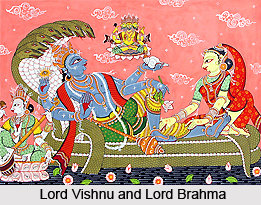 Lord Vishnu, the preserver of the universe, is associated with a fascinating legend stating the concept of time. Once, a conversation followed between Lord Brahma and Sage Narada in the presence of Vishnu. Sage Narada enquired from Brahma about the secrets of the universe.
Lord Vishnu, the preserver of the universe, is associated with a fascinating legend stating the concept of time. Once, a conversation followed between Lord Brahma and Sage Narada in the presence of Vishnu. Sage Narada enquired from Brahma about the secrets of the universe.
While explaining, Lord Brahma began eulogising about his immortality and his vast knowledge about the universe. Sage Narada praised Brahma for his talents that aggregated his pride. Lord Vishnu, who remained as a silent spectator during the whole conversation, appealed Brahma to accompany him to a particular place.
Vishnu manifested a chariot and welcomed Brahma in it. Together they flew to a realm of the universe about which Lord Brahma was completely unaware. Brahma due to his ignorance about the location stared in awe at the mysterious and beautiful surroundings. The chariot was halted for the Gods to descend. At a particular site he saw a sage engrossed in meditation.
Lord Vishnu went close the sage along with Brahma and requested him to introduce himself. The sage elucidated that he had been meditating at this site for eons and when the lifetime of one Lord Brahma ends, his one hair turns grey and falls off. He would die the day when all his hair falls off from his head Lord Brahma was astounded and was dumbfounded upon hearing this as he was of the opinion that till now that he was the only immortal being with no end to his powers.
Lord Brahma enquired whether there were any more such people in the mysterious realm. The sage directed him to another sage named `Ashtavakra`, having eight deformities in his body. The sage added that when all his hair fall off and he dies, one deformity of sage Ashtavakra would be cured. Vishnu thanking the sage and went ahead with Brahma to meet sage Ashtavakra.
Upon enquiring Brahma was enlightened with the fact that there are 108 ashtavakra saints similar to him in this realm. Ashtavakra added that when one ashtavakra was relieved of their deformities and dies, one deformity of the next ashtavakra is cured. And so on the cycle continues. Lord Brahma upon hearing this lost his ego and bowed down in front of Lord Vishnu.









